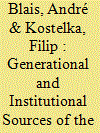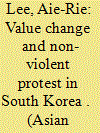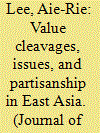|
|
|
Sort Order |
|
|
|
Items / Page
|
|
|
|
|
|
|
| Srl | Item |
| 1 |
ID:
181197


|
|
|
|
|
| Summary/Abstract |
Why has voter turnout declined in democracies all over the world? This article draws on findings from microlevel studies and theorizes two explanations: generational change and a rise in the number of elective institutions. The empirical section tests these hypotheses along with other explanations proposed in the literature—shifts in party/candidate competition, voting-age reform, weakening group mobilization, income inequality, and economic globalization. The authors conduct two analyses. The first analysis employs an original data set covering all post-1945 democratic national elections. The second studies individual-level data from the Comparative Study of Electoral Systems and British, Canadian, and US national election studies. The results strongly support the generational change and elective institutions hypotheses, which account for most of the decline in voter turnout. These findings have important implications for a better understanding of the current transformations of representative democracy and the challenges it faces.
|
|
|
|
|
|
|
|
|
|
|
|
|
|
|
|
| 2 |
ID:
148945


|
|
|
|
|
| Summary/Abstract |
Using the first, second, and sixth waves of the World Values Surveys, this article examines the extent to which the mass public's values have changed and/or persisted and their impact on political orientations, measured by protest potential and leftist ideology, in Korea. We find that the emergence of an authoritarian-libertarian value cleavage has played an important, if not vital, role in shifting mass political attitudes and in enhancing the propensity to engage in political action from the authoritarian rule, to the democratic transition, and to the period of democratic consolidation. We also empirically uncover our authoritarian-libertarian value scale is related to increasing levels of leftist reform-oriented attitudes, whereas age has become less important to Koreans in defining their orientations to political protest, especially during the period of democratic consolidation.
|
|
|
|
|
|
|
|
|
|
|
|
|
|
|
|
| 3 |
ID:
078406


|
|
|
|
|
| Publication |
2007.
|
| Summary/Abstract |
This article examines how the social transformation in many East Asian democracies is altering the value priorities of their publics, and how these values are affecting party choice. Our analyses are based on the newest wave of the World Values Survey. We find that the emergence of an authoritarian-libertarian value cleavage is clearly associated with level of development, but these values emerge well before what prior research indicated. In addition, we show that party loyalty among the East Asian citizenry is shaped by a mix of social values, economic issues, left-right ideology, distrust in governmental institutions, and proclivities to engage in protest activities.
|
|
|
|
|
|
|
|
|
|
|
|
|
|
|
|
|
|
|
|
|